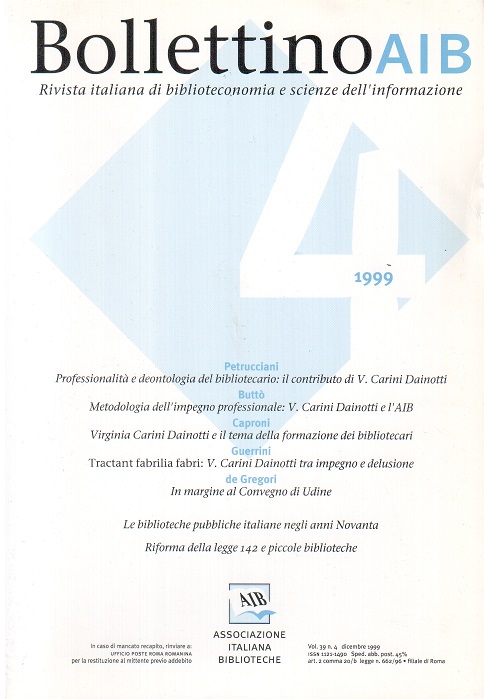Tractant fabrilia fabri: Virginia Carini Dainotti, una bibliotecaria tra impegno e delusione
Contenuto principale dell'articolo
Abstract
Reading about the speeches by Virginia Carini Dainotti published in professional magazines and volumes from the Forties to the Sixties, we have the impression of a very competent librarian and an intelligent and cultured Ministry official who happened to work in a political reality that was muddled and with an amateurish administration - that of Italy post World War II - incapable of realizing a project of an efficient, uniform, coherent and nation-wide library system, like those present in the countries of central-north Europe and the United States.
Carini Dainotti often dwelled upon the nature of the Italian Governments of the Fifties and denounced the lack of funds for libraries and the absence of a co-ordinated policy for libraries with the goal of educating Italians, both the working and middle classes. Carini Dainotti, with reference to Europe charged libraries with an aspect and function that may have appeared rather excessive, but nevertheless denoted the important place that libraries can have in social emancipation. While France, Belgium, England, Germany and the United States had nation-wide networks of libraries that enjoyed ample public finance, Italy totally neglecting investing in them.
Carini Dainotti knew what a nation-wide library system should be and moved the planning of the national reading service into a fully integrated position within the political and social reality of post World War II Italy. She was politically convinced that western democracy was the best possible and realized the necessity of constructing a public library, fundamental to democratic life in post-fascist Italy. She also claimed that in a modern democracy there was no reason to have a "popular" library but rather it was important a public library. That is a service of documentation and information offered to all citizens.
With the passing of time her trust in the actions of the Governments deteriorated. Carini Dainotti understood that the political class was uninterested in libraries and their use. She began a brave and motivated criticism of the projects and improvised experiments, financed by Ministers simply for electoral or ideological motives. She repeatedly confirmed that the policy towards a nation-wide library system must be centrally co-ordinated only by a general management of libraries and that libraries of every type had to be trusted to the management of professional librarians. She adopted the sentence of Horace, Tractant fabrilia fabri, which she took to mean that libraries and the promotion of reading had to be entrusted to librarians.
Carini Dainotti had a sense of impotence thinking that reality would not be modified. She criticized the Ministers of the time within the Ministerial structure but she never criticized the bureaucratic apparatus. Undoubtedly she had fully analysed the reality of the situation of Italian librarianship after the World War II. She fought for the creation of a modern library service and firmly proposed an ideal of competent librarians on the Anglo-Saxon and Northern European model, a context where she would have been appreciated. She wished to reverse the policy of that time from inertia and to elevate Italy to the standards of Europe and the United States needed much more than just the demands for professional pride.
Dettagli dell'articolo

Questo lavoro è fornito con la licenza Creative Commons Attribuzione - Condividi allo stesso modo 4.0.
